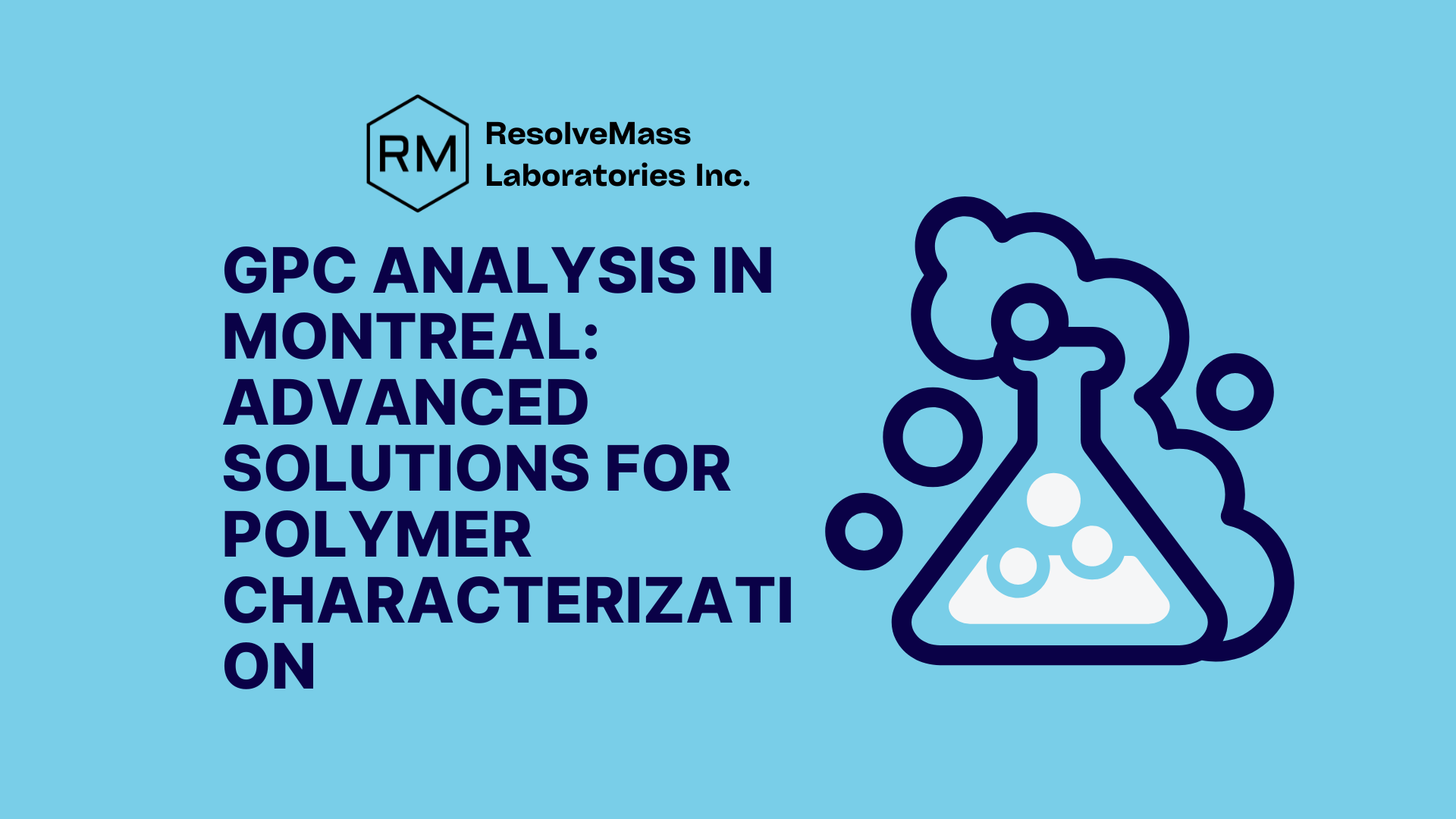Introduction
Size Exclusion Chromatography (SEC), also known as Gel Permeation Chromatography (GPC), is considered one of the most reliable techniques for studying polymers. It helps measure polymer size distribution, molecular weight, and branching in a precise way. This case study focuses on the SEC Analysis of Poly DADMAC Polymers, which are widely used as cationic polymers in water treatment, paper production, and personal care products.
By using SEC, laboratories like ResolveMass Laboratories Inc. can deliver accurate and reproducible molecular data. These insights support regulatory submissions, ensure product quality, and improve performance evaluations. In addition, SEC reveals how Poly DADMAC behaves under different processing conditions, confirming whether batches remain consistent from lab scale to full production. This consistency is vital for industries aiming to meet global safety and quality standards.
Need accurate insights into your Poly DADMAC polymers? Get in touch with our SEC/GPC specialists now!
🔑 Summary of the Case Study
- Poly DADMAC polymers require SEC testing to confirm molecular weight distribution and ensure consistent quality. Explore methods of measuring polymer molecular weight by GPC here.
- SEC/GPC separates molecules based on size instead of chemical properties, which makes it especially suitable for cationic polymers. Learn about GPC sample preparation best practices.
- The results from SEC guide improvements in water treatment efficiency, cosmetic stability, and regulatory compliance. See how GPC analysis aids quality control.
- ResolveMass Laboratories applies validated workflows and advanced instruments tailored to polymer analysis. Check out our GPC molecular weight analysis services.
- This case study highlights how SEC supports real-world quality control and product assurance programs.
In short, SEC is not only about laboratory testing—it also helps businesses make decisions about manufacturing, safety evaluation, and long-term product performance.
Why is SEC Analysis of Poly DADMAC Polymers Important?
The SEC Analysis of Poly DADMAC Polymers is essential because it provides accurate molecular weight distribution (MWD). MWD directly affects coagulation efficiency, flocculation behavior, and overall stability of the polymer. Without SEC testing, manufacturers risk inconsistent performance, production failures, or regulatory issues that could cause costly delays.
Key reasons include:
- It ensures batch-to-batch consistency in Poly DADMAC production.
- It validates performance in water treatment and industrial use.
- It provides regulatory-grade data for compliance submissions.
Additionally, SEC can reveal unexpected changes in polymer synthesis. Detecting these variations early allows manufacturers to prevent large-scale issues and maintain product reliability over time.
What is Size Exclusion Chromatography (SEC) in Polymer Testing?
SEC, also known as Gel Permeation Chromatography (GPC), separates polymers dissolved in a solution by their molecular size. Large molecules come out first, while smaller ones follow, creating a detailed molecular profile. For Poly DADMAC, this information is critical to ensure consistent behavior across its many applications. Learn more about GPC column and detector selection.
Advantages of SEC/GPC for Poly DADMAC
- Non-destructive testing method.
- Provides detailed molecular weight distribution.
- Detects impurities or degradation products in the sample.
Another advantage is its versatility. SEC can be used with both aqueous and organic solvent systems, making it suitable for many types of polymers. Explore the full GPC analysis of polymers . This precision ensures manufacturers can adjust synthesis and formulations with confidence.
Case Study: SEC Analysis of Poly DADMAC Polymers
ResolveMass Laboratories Inc. performed an SEC Analysis of Poly DADMAC Polymers produced for industrial use. The goal was to examine molecular weight and confirm quality consistency.
Procedure Overview
- Sample Preparation – Poly DADMAC was dissolved in an aqueous mobile phase.
- Instrumentation – Multi-angle light scattering (MALS) and refractive index detectors were used.
- Calibration – Narrow polystyrene sulfonate standards were applied for accuracy.
- Analysis & Reporting – Molecular weights (Mn, Mw) and polydispersity index (PDI) were calculated.
Results Summary (Illustrative Table)
| Parameter | Value Obtained | Industry Benchmark | Conclusion |
|---|---|---|---|
| Mn | 120,000 Da | 100,000–150,000 Da | Within range |
| Mw | 180,000 Da | 150,000–200,000 Da | Consistent |
| PDI | 1.5 | <2.0 | Excellent control |
Interpretation
The polymer showed a narrow molecular weight distribution, confirming precise and consistent synthesis. SEC confirmed that the sample met benchmarks for water treatment use.
This analysis not only confirmed compliance but also showed that Poly DADMAC maintains stability across repeated production cycles. This gives manufacturers confidence when scaling up without losing quality.
Read more about GPC analysis for drug delivery and industrial polymers
Applications of SEC Analysis of Poly DADMAC Polymers
The SEC Analysis of Poly DADMAC Polymers is applied across multiple industries to verify performance and safety standards.
Applications include:
- Water Treatment – Optimizing flocculation and coagulation processes.
- Personal Care – Ensuring cosmetic products remain safe and stable.
- Paper & Textile – Improving chemical processing and retention aids.
- Medical Device Coatings – Supporting ISO 10993-18 compliance requirements.
SEC data also reveals how Poly DADMAC interacts with other ingredients in complex formulations. This helps companies maintain product quality and reduce development timelines.
Explore advanced GPC molecular weight analysis.
Benefits of Partnering with ResolveMass Laboratories Inc.
Working with ResolveMass for SEC analysis ensures clients receive accurate results backed by scientific expertise.
Key Benefits
- Experience – Deep expertise in polymer testing projects.
- Expertise – Skilled scientists using advanced instruments.
- Authority – Published work and validated methods.
- Trustworthiness – Transparent, regulatory-ready reporting.
By choosing ResolveMass, clients gain access to dependable data that speeds up approvals, secures consistency, and supports innovation. Learn how GPC supports polymer quality control.
Conclusion
The SEC Analysis of Poly DADMAC Polymers is a powerful approach for confirming polymer consistency, performance, and regulatory compliance. This case study demonstrates how ResolveMass Laboratories Inc. applies validated SEC/GPC techniques to deliver accurate molecular profiles of Poly DADMAC.
From medical devices to industrial water treatment, their expertise ensures products meet global standards. By combining technical skill with trusted workflows, ResolveMass helps manufacturers maintain quality and reliability across every batch.
📞 Contact us today to discuss your SEC analysis needs:
FAQs on SEC Analysis of Poly DADMAC Polymers
SEC analysis provides a detailed picture of the polymer’s molecular weight distribution, chain length, and branching. These insights are important because they directly affect how Poly DADMAC performs in water treatment, industrial operations, and cosmetic formulations. Reliable results from SEC help manufacturers confirm that their product will work as expected.
The molecular weight distribution influences how well Poly DADMAC dissolves and binds with particles in applications like flocculation and coagulation. A narrow distribution ensures the polymer behaves consistently across different uses. This stability is critical for industries where predictable results are required to meet quality and compliance standards.
Unlike structural methods such as spectroscopy, SEC separates polymers based on their size in solution. This allows scientists to determine how uniform the polymer chains are and to detect variations between batches. Because of this, SEC is especially valuable when evaluating polymers like Poly DADMAC that are used in regulated applications.
Yes, SEC is sensitive enough to detect impurities or small degraded fragments within a sample. Identifying these unwanted components early helps manufacturers improve quality control and avoid performance issues. This makes SEC a reliable choice for industries that need to ensure polymer safety and stability over time.
The most common detectors include refractive index (RI), multi-angle light scattering (MALS), and ultraviolet (UV) detectors. When used together, these instruments provide highly accurate information on molecular weight and structure. Combining different detectors gives a more complete picture of Poly DADMAC’s characteristics.
In many cases, yes. Regulatory agencies often require detailed molecular weight information for polymers used in water treatment, cosmetics, and medical devices. SEC provides the type of validated, precise data needed for these submissions. Using SEC testing ensures that products meet compliance requirements and avoid costly delays.
Sample preparation usually involves dissolving Poly DADMAC in an aqueous mobile phase. The pH is carefully adjusted to prevent polymer aggregation, which could interfere with accurate results. Proper preparation is essential because it ensures that the analysis reflects the true molecular properties of the polymer.
Absolutely. SEC data helps manufacturers optimize polymer synthesis and refine formulations for better efficiency. By understanding molecular weight distribution, companies can make informed decisions that speed up product development and reduce risks. This means products reach the market faster with reliable performance.
References
- Rozio, M. G. (2025). Correcting detection and quantitation bias in extractables and leachables testing. Journal of Pharmaceutical Sciences, 114(4), 1234–1245. https://doi.org/10.1016/j.xphs.2025.01.001
- Balfour, H. (2022, April 29). Advancing extractables and leachables testing. European Pharmaceutical Review. https://www.europeanpharmaceuticalreview.com/article/170814/advancing-extractables-and-leachables-testing/
- Eckford, C. (2024, January 22). Single-use systems to drive E&L testing market growth. European Pharmaceutical Review. https://www.europeanpharmaceuticalreview.com/news/196367/single-use-systems-to-drive-el-testing-market-growth/


